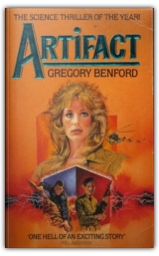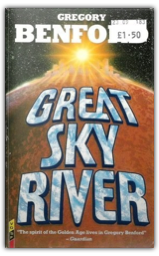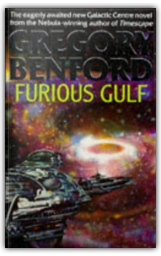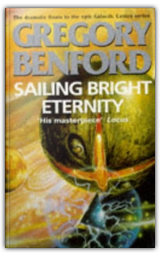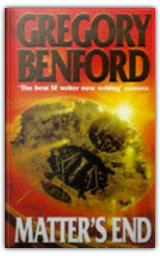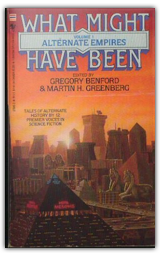 Alternate Empires
Gregory Benford
Alternate Empires
Gregory Benford
Startling alternative history has been a popular sub-genre of military history and science fiction for years and has recently reached new heights of popularity with Harry Turtledove's epic alternative histories of WWII and the American Civil War. Gregory Benford, Hugo and Nebula Award winning author, here collects original stories by such luminaries as Poul Anderson, Larry Niven, Frederik Pohl, Kim Stanley Robinson and Robert Silverberg in alternative histories from ancient times to the 20th century. 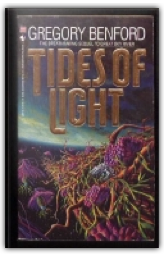 Tides of Light
Gregory Benford
Tides of Light
Gregory Benford
Continuing the story begun in Great Sky River, Benford creates a stunning novel of the last band of humans fleeing extinction in the Galactic Center. And with one enemy behind them, the humans are dismayed to discover on a remote planet an alien race more awesome than any they have encountered. Reprint from Spectra. 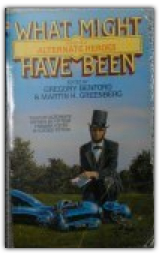 Alternate Heroes
Gregory Benford
Alternate Heroes
Gregory Benford
What would have happened if history had been different-if the major events that shaped our times had occurred in a different way-or not at all? From a Confederacy that won the Civil War to a Europe converted to Viking paganism.These bold excursions in time depict bizarre new worlds-oddly familiar, disturbingly different-a glimpse of WHAT MIGHT HAVE BEEN. 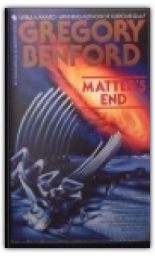 Matter's End
Gregory Benford
Matter's End
Gregory Benford
A collection of twenty-one stories features unexpected revelations at a masquerade party, a devastating California earthquake, a complex computer game that becomes a matter of life and death, and more. 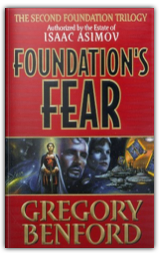 Foundation's Fear
Gregory Benford
Foundation's Fear
Gregory Benford
This is the first instalment of The Second Foundation Trilogy, based on Isaac Asimov's famous Foundation series. Acclaimed hard science fiction writers Gregory Benford, David Brin and Greg Bear will each produce a work for the trilogy. Benford kicks off exploring the beginnings of the Foundation itself and its creator, Hari Seldon. Seldon is working on a project to ease the inevitable collapse of the universe- spanning Empire and the Dark Ages that will ensue. But the current emperor has other plans, like appointing Seldon first minister and thus thrusting him into a world of political intrigues and assassination attempts that ultimately will bring him up against future history's greatest threat. 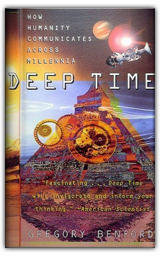 Deep Time: How Humanity Communicates Across Millennia
Gregory Benford
Deep Time: How Humanity Communicates Across Millennia
Gregory Benford
Physicist and science fiction author Gregory Benford says there are two main impulses behind human efforts to communicate with future societies. The first, "High Church," shouts beauty, ego, and awe across the millennia: See how amazing our pyramid-building skills were? The Seven Wonders of the World would fall into this category—if they had lasted. Monuments, cathedrals, tombs, anything that says, "This great object meant something to us." On a much more mundane (and human) level is the "Kilroy" impulse: I lived! You needn't look hard to find evidence of this temporal communication: graffiti is as old as humanity, and latter-day taggers are following in the footsteps of Greek mercenaries (who left their names all over Egyptian monuments, Lord Byron (who carved his name into the Temple of Poseidon), and legions of anonymous ancient scribblers. 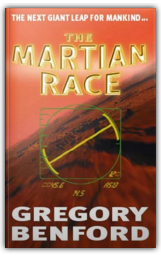 The Martian Race
Gregory Benford
The Martian Race
Gregory Benford
Esteemed Mars guru Bob Zubrin calls The Martian Race "one of the finest novels about human exploration of the Red Planet ever written." But then again, Bob is a character in the book (albeit in the briefest of cameos), so what else could he possibly say? That notwithstanding, Zubrin's right—he couldn't have picked a better book to show his face in. By popular assent, The Martian Race deserves top honours among the millennial wave of Mars exploration tales, propelled as it is by the skilful storytelling of physics doyen Gregory Benford, a Campbell and two-time Nebula winner. |
 Made with Delicious Library
Made with Delicious Library
London, State zipflap congrotus delicious library Scott, Mike
